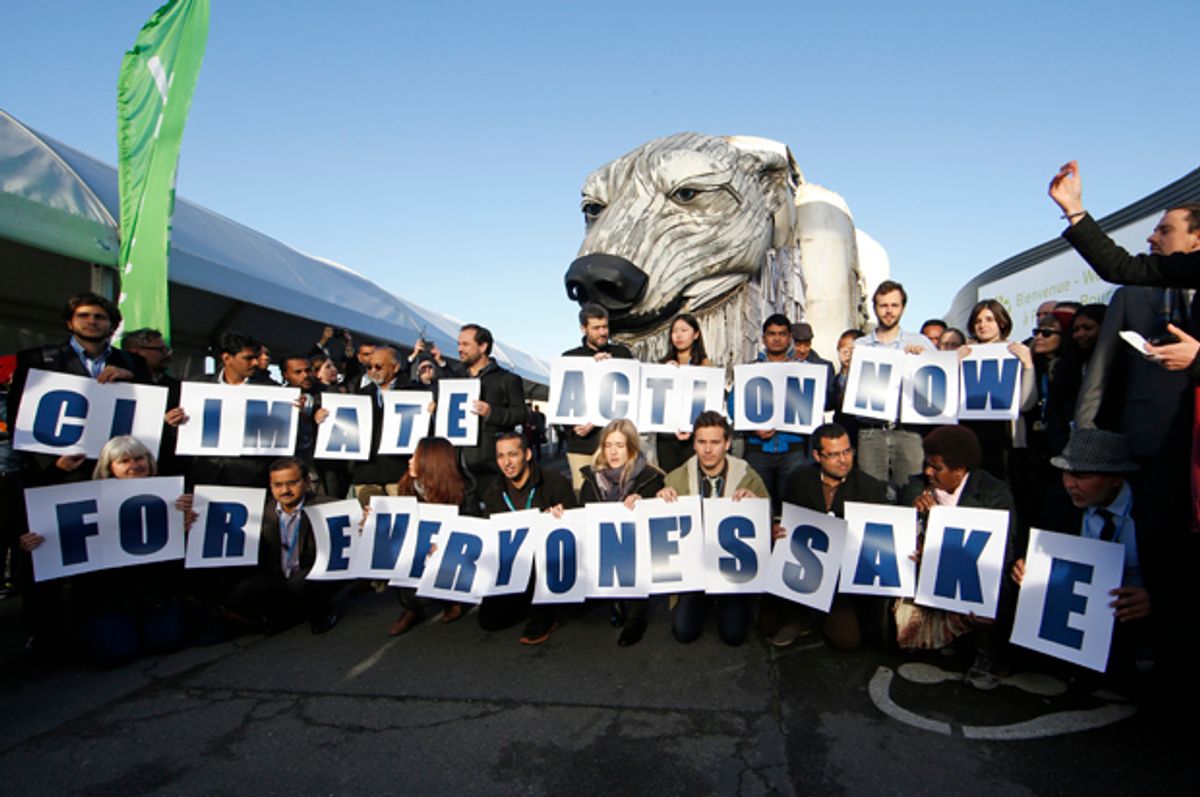We in Paris at the climate summit, and people all over the world, are hoping for a giant leap for humanity. Some of us are here officially. I and tens of thousands of others knew we had to show up, to witness, to speak, to act, to do whatever it takes to give courage to the negotiators, to each other, and to everyone after this week.
At the COP21 Green Zone and in venues all over Paris, I’ve been energized connecting with so many people from so many places who share a sense of urgency. I’ve been inspired meeting young adults postponing their life plans to devote themselves to climate activism. And I’ve been sobered talking with people whose relatives died from climate-fueled extreme weather. For them, climate change is not an abstract or future problem. Their countries are washing away.
Is there a connection between climate change and how we respond to millions of refugees in a world with unacceptable inequality, and how we in the U.S. have begun to say black lives matter? Could addressing climate change become the driver to make every life count?
The U.S. had its first large group of climate refugees 10 years ago, after Hurricane Katrina. Refugees from Syria are fleeing a country destabilized by the drought that began in 2006. And as we meet, weeks of rains and floods in South Asia have killed hundreds of people and left more than a million people homeless.
The world’s poorest nations are already experiencing devastating losses from climate change. The 44 countries in the Climate Vulnerable Forum are losing 50,000 lives and 2.5 percent of gross domestic product each year. They have stepped up to do their part, pledging to power their nations with 100 percent renewable energy by 2050.
Big countries and companies came to the Conference of Parties with more modest 2050 aspirations. Their goal: keeping greenhouse gas concentrations low enough to hold the rise of global temperature under 2° Celsius/3.6° Fahrenheit). Yet not a single leader or observer at the Conference of Parties says the main result of COP21 — the nation-by-nation pledges -- gets close to that.
The 39 members of the Association of Small Island States know 2° was just a negotiated level, and it could be catastrophic for them. They say the world needs to stay under 1.5° C, which could reduce sea level rise by 50 percent. After they met with President Obama, he said many of their nations could disappear, resulting in tens of millions of climate refugees. The expression “the canary in the coal mine” has never resonated more.
A "high ambition coalition" emerging at COP21 could offer more protection to the most vulnerable and pave the way for the entire world to go renewable by 2050. It started with statements supporting 1.5° from France and Germany. Now it includes more than 100 developed and developing nations. This could mark the end of an "us vs. them” mentality that has pretended we don’t all live on the same planet, and business calculations that don't value stable civilizations and ecosystems.
The high ambition coalition recognizes that the risks faced by mostly southern nations are a preview of what we all face. And its members have taken courage from seeing evidence all around them at Le Bourget that communities and companies are just waiting to get started on a sustained emergency mobilization to shift to renewable energy sources — and defuse the power of entrenched fossil fuel interests.
Seventy years ago, 51 nations founded the United Nations. Back then, international cooperation was a worthy ideal. Now it’s crucial if civilization is to survive. In September, the U.N. started taking the meeting of Sustainable Development Goals by 2030 seriously. Achieving those goals will contribute to climate solutions. And the cost of resources and assistance to enable more than 100 poor nations to get off fossil fuels will be a rounding error for the world economy.
For instance, even as COP21 is struggling to raise $100 billion a year for the global Green Climate Fund, a few companies could act to raise the stakes. Last year, University of California, Berkeley, professor Dan Kammen and I proposed a way for a billion people in Asia and Africa to get electricity to charge their cellphones and light their homes without poisonous kerosene. A $25 billion revolving loan fund could enable companies already manufacturing and selling small pay-as-you go solar systems to scale up. Apple or another of the many U.S. companies that now park more than $2 trillion in profits abroad could go beyond “green business-as-usual” at the cost of a lower interest rate for five years.
Can the world afford the switch to renewables? The International Monetary Fund identifies global energy subsidies for fossil fuels at $5.3 trillion per year, or 6.5 percent of the global GDP. Removing direct subsidies and putting a price on emissions could provide vast financing. Happily, a new international platform, the Carbon Pricing Leadership Coalition, aims for every country to have in place a mechanism to price carbon by 2020.
The discussion at Le Bourget would change if the people who know we need most economies to be 100 percent renewable by 2050 take a leap and say, “The sooner we get there, the better our lives will be, the safer our world will be, and the better future we will leave to our children.” And since we're all in this together, we can start by protecting those most at risk.
Felix Kramer’s articles and projects for climate awareness solutions are at BeyondCasssandra.org. Contact: fkramer@calcars.org; http://FelixKramer.com.

Shares